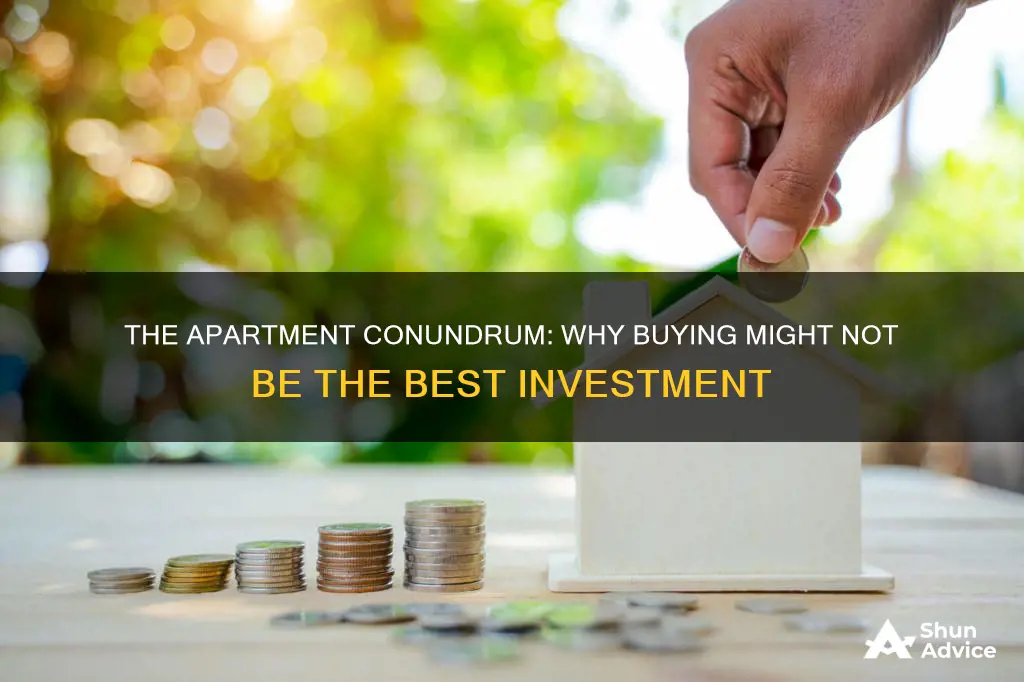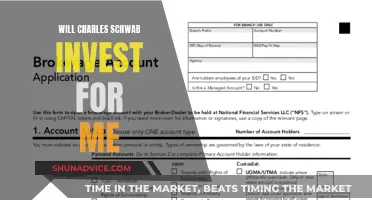
There are many factors to consider when deciding whether to buy an apartment as an investment. Firstly, it's important to understand the local market and predict its future trajectory. If there is an oversupply of apartments in the area, it may be best to avoid investing as this can limit resale potential and rental demand. Additionally, the type of apartment matters; smaller apartments may have less potential for capital growth and can be more expensive to rent per person, while older apartments may have higher maintenance costs. Buying an apartment can also be a significant financial burden, requiring a large upfront payment and ongoing costs such as property taxes and maintenance. However, there are also benefits to investing in apartments, such as tax depreciation benefits for newer properties and the potential for positive cash flow if rented out. Ultimately, the decision to buy an apartment as an investment depends on various factors, including market conditions, financial considerations, and individual circumstances.
What You'll Learn
- Apartments may have less potential to add value and limited capital growth
- High strata levies in newer apartment blocks
- Apartments in high-rise blocks have less resale potential
- Buying an apartment may not be a good investment if you can't afford it
- Apartments may be a bad investment if you're looking for a quick profit

Apartments may have less potential to add value and limited capital growth
Secondly, apartments have limited renovation opportunities. Owners have less control over renovations as they are subject to body corporate regulations and may require approval for any changes. In contrast, houses offer greater freedom to subdivide and renovate, allowing investors to add significant value to the property.
Additionally, the lack of land associated with apartments restricts the potential for subdividing the property, further reducing the opportunities for capital growth.
Apartment investors should also consider the impact of strata or body corporate fees on their investment. While these fees cover maintenance and management of common areas, they can be expensive and eat into cash flow if not carefully managed.
Furthermore, the size of an apartment can impact its potential for capital growth. Smaller apartments, such as studios or one-bedroom units, may have limited buyer and tenant markets, affecting their ability to generate strong rental returns and achieve capital growth.
Lastly, the position of an apartment within a block can influence its value. While top-floor apartments offer more privacy and better aspects, they may not be suitable for certain tenants, such as those with prams, wheelchairs, or the elderly. Ground-floor units, on the other hand, may have more limited views and natural light, affecting their appeal to tenants.
The 7-Year Investment Itch: When Do Long-Term Investments Pay Off?
You may want to see also

High strata levies in newer apartment blocks
Strata levies are the costs incurred by owners of apartments or units in a strata complex, which are used to cover the day-to-day expenses and long-term maintenance of the building. These levies are typically split into two types: the Administrative Fund Levy and the Capital Works Fund Levy. The former covers expenses such as cleaning, strata management fees, insurance, and routine repairs, while the latter is meant for major long-term maintenance works like replacing lifts or repainting the building's facade.
Newer apartment blocks with contemporary amenities such as concierge and valet services, gyms, and swimming pools tend to have higher strata levies. These additional facilities come at a cost, and the associated levies can rise to new heights, potentially harming your cash flow.
When considering purchasing a unit in a newer apartment block, it is essential to understand the strata levies and what they cover. Do not rely solely on the agent's word, as they may not always provide accurate information. Instead, look at comparable buildings and their levies to get a sense of what is typical for the area and the type of building.
To avoid unexpectedly high strata levies, ensure that the building is collecting enough levies to cover the costs of maintaining the facilities. Additionally, follow the Capital Works Fund Forecast, which helps plan for major maintenance items by raising sufficient funds over time. This ensures that special levies, which are needed when unexpected expenses arise, can be avoided.
Will.i.am's Tech Vision: The Power of Passionate Investment
You may want to see also

Apartments in high-rise blocks have less resale potential
When considering the purchase of an apartment, it is important to be aware of the potential drawbacks of investing in a unit within a high-rise block. While high-rise apartments may offer certain advantages such as prime city locations and spectacular views, they also come with a unique set of challenges and limitations.
One of the main concerns with high-rise apartments is the limited resale potential. The very factor that makes high-rise living desirable, the height, can also be a deterrent for potential buyers. The higher the apartment, the more limited its appeal may be to certain sectors of buyers, such as those with prams, wheelchairs, or the elderly, who may find it challenging to access. Additionally, high-rise apartments often suffer from increased competition due to the large number of identical units within the same block, all vying for the same pool of tenants or buyers. This abundance of similar properties can restrict resale potential and rental demand, impacting the overall value of the investment.
The design of high-rise apartments also presents limitations. The vertical nature of these structures limits their horizontal space, resulting in stringent building and fire codes, as well as restricted design options. High-rise apartments often adhere to only a few different layouts, or sometimes even a single layout throughout the entire building. This lack of diversity can be off-putting to buyers who value unique and flexible living spaces.
Furthermore, high-rise apartments tend to be more expensive, not only in terms of the initial purchase price but also in terms of ongoing costs. The amenities and high-quality features that high-rise buildings offer come at a price. From luxurious interiors to state-of-the-art gyms and rooftop terraces, these additional perks drive up the overall cost of living in a high-rise. Additionally, high-rise apartments require more intensive and constant upkeep, with elevators being a critical component that demands regular maintenance and inspections.
When considering the resale potential of high-rise apartments, it is worth noting the impact of market saturation. In certain locations, there may be an oversupply of high-rise units, causing a decrease in demand and putting downward pressure on prices. Prospective investors should carefully research the local market, assessing the relationship between supply and demand. Areas where the supply of units fails to meet rental demand are more likely to offer profitable investment opportunities.
Lastly, the environmental impact of high-rise apartments cannot be overlooked. Despite the potential for sustainable construction and eco-friendly technologies, the sheer amount of materials, resources, and energy required to build and maintain these towering structures contributes significantly to the climate crisis. This negative environmental impact may deter environmentally conscious buyers, further reducing the pool of potential buyers and impacting resale potential.
In conclusion, while high-rise apartments may offer certain advantages, they also come with drawbacks that can hinder their resale potential. Prospective investors should carefully weigh the benefits against the limitations before making a decision, ensuring that a high-rise apartment aligns with their unique needs, priorities, and long-term goals.
Unlocking the Door to Investment: A Guide to Buying Your First Investment Home
You may want to see also

Buying an apartment may not be a good investment if you can't afford it
High upfront costs
Purchasing an apartment requires a large upfront payment, which can significantly impact your financial liquidity. This includes the down payment, which is typically between 15% to 25% of the property's value, as well as closing costs and moving expenses. If you're taking out a loan, you'll also need to consider the interest rates and monthly mortgage payments, which can be a significant financial burden if not managed properly.
Opportunity cost
When you buy an apartment, you're potentially forgoing other investment opportunities. The money tied up in the property, including the down payment and any renovations or maintenance, could have been invested elsewhere and generated a higher return.
Hidden costs and ongoing expenses
Apartment ownership comes with a range of ongoing expenses that can quickly add up. Maintenance and repair costs, property taxes, homeowners association fees, insurance, and utility bills are just some of the costs you'll need to factor in. These expenses can eat into your rental income or savings, impacting your overall financial health.
Limited control over certain factors
As an apartment owner, you're subject to market forces and external factors that can influence the value of your investment. For example, a saturated market with an oversupply of similar units can drive down prices and rental demand. Additionally, decisions made by the strata or homeowners' association, such as levy increases to cover the cost of building amenities, can affect your cash flow.
Time and effort
Being a landlord or property owner requires a significant time investment. From choosing the right property to managing tenants and handling maintenance issues, it can be a demanding role. If you're not able to dedicate the necessary time and energy, you may need to hire a property manager, which comes at an additional cost.
In summary, while buying an apartment can be a good investment, it's important to carefully consider your financial situation and do thorough research before making a decision. Affordability is a key factor, and if purchasing an apartment stretches your budget too thin, it may not be the right choice for you.
Wall Street's Annual Investors
You may want to see also

Apartments may be a bad investment if you're looking for a quick profit
While investing in apartments or other real estate can be a good way to build wealth over time, it may not be the best option if you're seeking a quick profit. Here are some reasons why apartments, in particular, may not be the ideal investment strategy for those seeking rapid financial gains:
Market Conditions and Timing
The real estate market is subject to fluctuations, and timing your investment correctly is crucial. Buying an apartment during a market peak may result in purchasing at an inflated price, reducing the potential for short-term profit. Conversely, buying during a market downturn may result in lower prices, but there is a risk of the property's value not recovering quickly, delaying any potential profit.
Over-supplied Markets
Some areas may have an over-supply of apartments, particularly in locations with numerous new developments. Investing in such markets can be risky, as the high supply may lead to lower prices and increased competition among landlords. Look out for warning signs, such as numerous new apartment blocks under construction, which may indicate an over-supplied market.
Limited Demand and Tenant Pool
Small apartments, such as studios or one-bedroom units, may have limited demand and a smaller tenant pool. These apartments may be more expensive per person to rent, making them less attractive to potential tenants. As a result, you may struggle to find tenants or achieve strong rental returns, hindering your ability to make a quick profit.
High-Rise Blocks
Investing in a unit within a high-rise block can be risky due to increased competition. With numerous identical units in the same block, you will be competing with other investors for tenants or buyers. This situation can reduce your resale potential and rental demand, making it challenging to generate a rapid profit.
Off-the-Plan Purchases
While buying an apartment off-the-plan can offer significant gains, it also carries considerable risk. If the market moves against you, you could lose a substantial amount of money. It is challenging to predict market movements, and an off-the-plan investment may not be the best choice if you seek a quick profit without taking on high levels of risk.
In conclusion, while apartments can be a sound long-term investment strategy, they may not be ideal for those seeking a quick profit. The real estate market is subject to various factors that can influence profit potential, and it is essential to carefully consider your investment goals, risk tolerance, and market conditions before making any decisions.
The S&P 500: A Retirement Investment Strategy for States
You may want to see also
Frequently asked questions
It depends on your financial situation and the local market. Apartments can be a good investment if you can find a good deal, but there are also risks involved.
There are several risks to consider when investing in an apartment, such as oversupply in the market, limited buyer and tenant demand, high strata levies, and the potential for negative cash flow.
Apartments can provide strong rental returns and lower maintenance costs compared to houses. They can also offer tax benefits, such as depreciation write-offs and passive activity loss deductions.
From a pure investment standpoint, the stock market is likely to provide higher returns than investing in an apartment. However, apartments can provide other benefits such as housing services, security, and a sense of pride.
It is important to do your research and consider factors such as the local rental market, the type of market you are buying into, interest rates, and the size of your down payment. You should also have a Plan B in case your assumptions are wrong, such as renting out the apartment if it does not appreciate in value.







